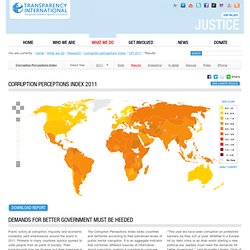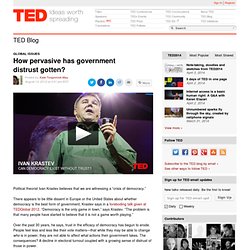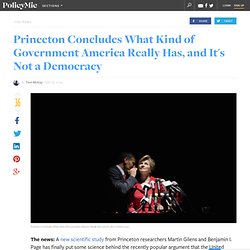

Corruption Perceptions Index: Transparency International. Public outcry at corruption, impunity and economic instability sent shockwaves around the world in 2011.

Protests in many countries quickly spread to unite people from all parts of society. Their backgrounds may be diverse, but their message is the same: more transparency and accountability is needed from our leaders. The 2011 Corruption Perceptions Index shows that public frustration is well founded. No region or country in the world is immune to the damages of corruption, the vast majority of the 183 countries and territories assessed score below five on a scale of 0 (highly corrupt) to 10 (very clean.) New Zealand, Denmark and Finland top the list, while North Korea and Somalia are at the bottom. The Corruption Perceptions Index ranks countries and territories according to their perceived levels of public sector corruption. Money in politics drives up U.S. corruption perception index. The United States scores worse than many of its partners in the developed world on this year's Corruption Perception Index in part because of money in politics, the group that publishes the index said Wednesday.
Transparency International's compilation of surveys by well known civic and business groups ranked the U.S. at 19 among 174 countries, with No. 1 being the country with the least perception of corruption (a ranking shared by Denmark, Finland and New Zealand) and No. 174 (Somalia) being the country perceived as the most corrupt. Among the nations getting a better ranking than than the U.S. were Singapore, Australia, Canada, Germany, and Japan.
More than two-thirds of the countries scored below 50 on the CPI index. The perfect score, for a "very clean" society is 100. The U.S. score: 74, which most school teachers might mark a "C. " Investigating Corruption Risk in Your State Government - State Integrity Investigation. How pervasive has government distrust gotten? .

Political theorist Ivan Krastev believes that we are witnessing a “crisis of democracy.” There appears to be little dissent in Europe or the United States about whether democracy is the best form of government, Krastev says in a foreboding talk given at TEDGlobal 2012. “Democracy is the only game in town,” says Krastev. “The problem is that many people have started to believe that it is not a game worth playing.” Over the past 30 years, he says, trust in the efficacy of democracy has begun to erode. To hear Krastev’s fascinating and counterintuitive thoughts on how this crisis came to be, listen to his talk. In his talk, Krastev shares some startling recent findings—that only 18% of Italian and just 15% of Greek citizens believe that their vote matters. Krastev also referenced another “Future of Europe” survey question in his talk.
Edelman, the global public relations firm, has conducted an annual “Trust Barometer” for 12 years running. So, what can be done? Larry Bartels on Income Inequality and Social Policy (complete interview) Economic Inequality and Political Representation. Princeton Concludes What Kind of Government America Really Has, and It's Not a Democracy. The news: A new scientific study from Princeton researchers Martin Gilens and Benjamin I.

Page has finally put some science behind the recently popular argument that the United States isn't a democracy any more. And they've found that in fact, America is basically an oligarchy. An oligarchy is a system where power is effectively wielded by a small number of individuals defined by their status called oligarchs. Members of the oligarchy are the rich, the well connected and the politically powerful, as well as particularly well placed individuals in institutions like banking and finance or the military. For their study, Gilens and Page compiled data from roughly 1,800 different policy initiatives in the years between 1981 and 2002. It's beyond alarming. This problem has been steadily escalating for four decades.
Piketty and Saez also calculated that as of September 2013 the top 1% of earners had captured 95% of all income gains since the Great Recession ended. What kind of oligarchy? Www.princeton.edu/~mgilens/Gilens homepage materials/Gilens and Page/Gilens and Page 2014-Testing Theories 3-7-14.pdf.